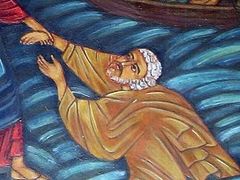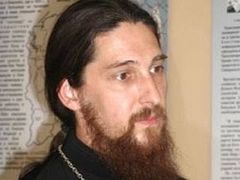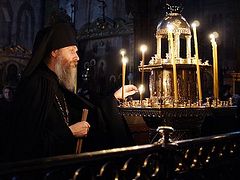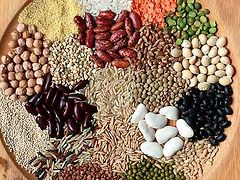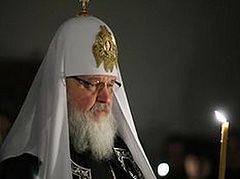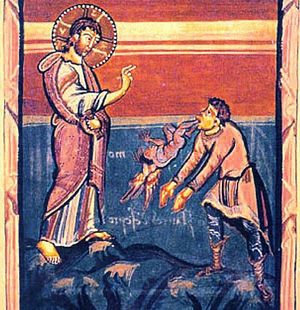
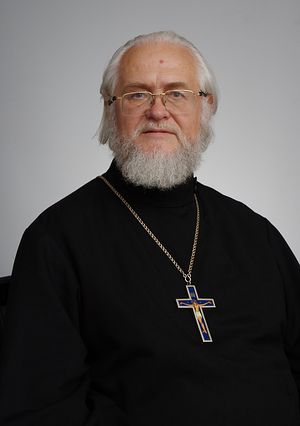
—Great Lent is here. Having cast out the unclean spirit from the demon-possessed youth, the Lord said to His disciples who had tried before Him to heal the unfortunate one but couldn’t: This kind goeth not out but by prayer and fasting (Mt. 17:21), by this setting forth fasting as a means of spiritual warfare on the same level as prayer. Just as prayer is called to be the state of a person’s soul that reaches for communion with God, so fasting (or abstinence) is not just an exercise we do from time to time, on certain days or periods, but a way of life to which a Christian is called. But due to the unavoidable weakness of her children, the Church like a caring mother has established for us times and periods of increased and lightened fasting, encouraging us with greater zeal to fast on Wednesdays and Fridays, and also to keep longer fasts: the Apostles’ fast, the Dormition fast, the Nativity fast, and finally, preceding Pascha the strictest and longest fast of the Great Forty Days with Passion Week following.
In the typicon are the schedules of what can be eaten on each day of Great Lent, presupposing the exclusion of other foods. In its literal content, the typicon now in force, which was basically compiled in the Lavra of St. Savva the Sanctified, was meant for monastics who lived in the monastery. However, there is no other rule of fasting for laypeople. So, conscientious Orthodox laypeople keep the appointed typicon, allowing themselves to depart from it only in accordance with the traditions of their Local Church, or at the advice of their spiritual fathers, taking into consideration sickness or other special circumstances that would make a strict observance of the fast impossible. But in departing from the letter of the Typicon we are called to always remember Who and what we emulate as we fast: Before beginning His preaching the Gospel of the Kingdom of Heaven to the world, the Lord Jesus Christ first fasted for forty days, remaining in the desert and abstaining from all food and drink; and Passion Week is dedicated to the remembrance of His betrayal to the judges, His passion and death on the Cross that saved the human race. During the course of the fast the Christian soul becomes more capable of approaching that grace-filled state called voluntary co-crucifixion with Christ. But this happens only on the definite condition that the fast is accompanied by heartfelt repentant prayer and partaking of the Church sacraments.
By his sinfulness, man is capable of corrupting any good work. If we keep the fast without penitent prayer, and ascribe our abstinence from food to our own merits instead of to the action of God’s grace, it will threaten to stir up in the soul not humility, but pride and high-mindedness, leading not to condemnation of ourselves—and we all have much that deserves condemnation—but of our neighbors, whose inner life is a mystery to us and whose deeds we often judge wrongly and unfairly. One of the stichera of the Lenten Triodion warns us against this danger: “O my soul, if you fast from foods but are not cleansed of the passions, in vain do you rejoice in your abstinence from food: for it will not be unto your salvation, and as one false you will be loathsome to God, and make yourself like the evil demons who eat nothing.” The faster who has not cleansed himself of the passion, who is prideful, high-minded, and judgmental of his neighbor is like the evil demons, who never eat food.
It is also important in abstaining from animal products, wine, and marital relations that we do not fall into the perilous sin of disdaining meat, wine, and marriage, for all of this was created or established by God and intended for the support and continuation of life. The 51st Apostolic canon strongly condemns those who have fallen into the false asceticism of Manichean leaven: “If any bishop, presbyter, or deacon, or any one of the sacerdotal list, abstains from marriage, or flesh, or wine, not by way of religious restraint, but as abhorring them, forgetting that God made all things very good, and that he made man male and female, and blaspheming the work of creation, let him be corrected, or else be deposed, and cast out of the Church. In like manner a layman.”
The Church of Christ teaches us that fasting is not a goal in and of itself, but rather a means by which we can obtain true humility and purify our souls of passionate and sinful thoughts, free it from slavery to sin, and acquire the grace of the Holy Spirit.

